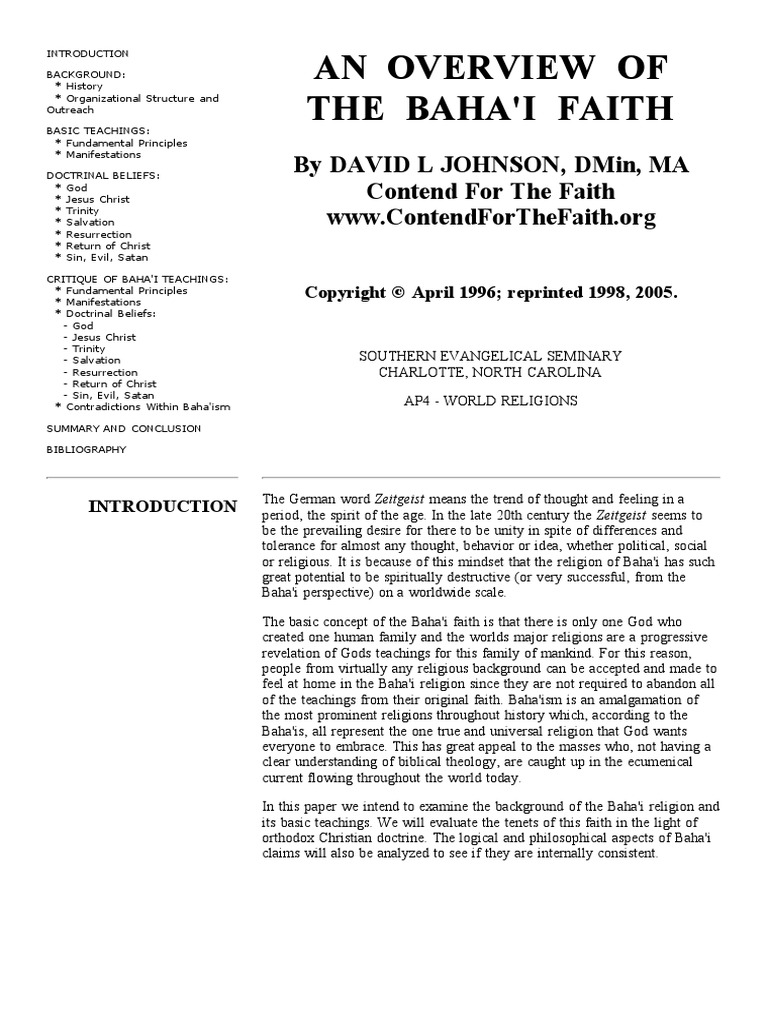What transforms a mere belief into a flourishing faith? This inquiry invites one to delve into the genesis of the Bahá’í Faith, a faith characterized by its commitment to unity and the principles laid forth by its founding figures. The narrative is not merely historical; it is a profound exploration of the human spirit’s capacity to transcend divisions and embrace a holistic vision of global unity.
The Bahá’í Faith emerged in the mid-19th century in Persia, a locale steeped in the mystique of various religious traditions. This vibrant cultural tapestry provided the fertile soil from which the teachings of Bahá’u’lláh, the central figure of the Bahá’í Faith, arose. It is vital to grasp how this transformation began with the forerunner, the Báb, whose role was to prepare the way for the eventual revelation of Bahá’u’lláh.
The Báb, born Siyyid Ali Muhammad, proclaimed the advent of a new messenger of God. He catalyzed fervent spiritual awakening among the populace, advocating for radical change and challenging the entrenched societal norms. His teachings heralded a new epoch, wherein the concept of progressive revelation became a cornerstone. This entails that God has continuously revealed divine guidance through various messengers throughout history, each tailored to the needs of their respective eras. Thus, the stage was set for the transformation of a society languishing under dogma into one receptive to divine renewal.
Imagine a society shackled by rigid traditions; how do its members reconcile the call for transformation with the inertia of old customs? The struggle to find common ground between the past and the present is a quintessential challenge faced not only by individuals but also by entire communities. The Báb’s declaration provided the impetus for such introspection, allowing individuals to question the legitimacy of prevailing beliefs, thereby inviting them to a realm of spiritual awakening and personal transformation.
As the narrative unfolds, we arrive at the pivotal moment of Bahá’u’lláh’s emergence. Imprisoned and exiled due to his revolutionary ideas, Bahá’u’lláh experienced profound revelations during his incarceration, through which he articulated the core tenets of the Bahá’í Faith. His declaration in the Garden of Ridván in 1863 – a veritable cornerstone in the annals of the Faith – proclaimed not only his station as a divine messenger but also his mission: to unite all of humanity under the umbrella of peace, justice, and equality.
This declaration posed a radical challenge to the status quo. Would humanity heed the call to transcend ethnicity, nationality, religion, and class divisions? Bahá’u’lláh’s teachings emphasized the oneness of humankind, fostering a vision that champions collective responsibility for a flourishing world. Such principles stand in stark contrast to widespread notions of division and conflict, urging individuals to reconsider their ideologies and embrace a broader, more inclusive identity.
Further enriching this narrative is the concept of duality, where individuals reconcile the dichotomies present in human experience. Bahá’u’lláh elucidated that humanity must engage with both its material and spiritual dimensions. This interplay is critical; the neglect of either aspect results in an imbalanced existence. By promoting a lifestyle that harmonizes temporal pursuits with spiritual aspirations, Bahá’í teachings advocate for an integrated approach to personal and communal growth.
Next is the transformative impact of education, a pillar upon which the Bahá’í Faith rests. Education is regarded as a fundamental right and a catalyst for societal progression. By providing equitable access to knowledge for all, the Bahá’í community endeavors to eradicate ignorance and prejudice. Education is not merely a means of information acquisition; it serves as an instrument for spiritual enlightenment, fostering individuals who can contribute positively to their communities and the world at large.
Moreover, the principles of consultation serve as an essential method for addressing challenges within the community. This democratic process encourages open dialogue and collective decision-making, thereby transcending the divisive forces of individualism and authoritarianism. By fostering an environment where every voice counts, the Bahá’í community exemplifies a model of collaboration that stands in stark opposition to conflict-driven dialogues prevalent in many societies.
The tenets of the Bahá’í Faith also challenge the very foundations of conventional religious practices. The rejection of clergy and the emphasis on personal spiritual growth invite individuals to cultivate a direct relationship with the divine. This decentralization of authority empowers adherents to navigate their spiritual journey authentically, thereby engendering a faith that is accessible and adaptable to personal interpretations while remaining anchored in the teachings of Bahá’u’lláh.
However, this journey is not without its hurdles. As the Bahá’í community strives to manifest these transformative principles, it encounters opposition and misunderstanding. The challenges of integrating such progressive ideals in a world rife with tradition, skepticism, and division require unwavering perseverance and a commitment to dialogue. It poses the question: Can humanity, conditioned by historical discord, rise to embrace a vision that reconciles differences in pursuit of a unified existence?
In conclusion, the beginning of the Bahá’í Faith is not merely a story of transformation; it is a clarion call to humanity’s highest potential. The teachings of Bahá’u’lláh invite a profound intellectual and spiritual endeavor, in which individuals are called to transcend their limitations and engage with the overarching narrative of unity. As humanity grapples with contemporary challenges, the timeless wisdom of the Bahá’í Faith stands as a guiding light toward a more harmonious existence. The journey is ongoing, and its success hinges upon individual and collective commitment to the principles of love, justice, and unity championed by Bahá’u’lláh. Will we, as a global community, answer this profound call and embark on the transformative quest to realize a more united world?
